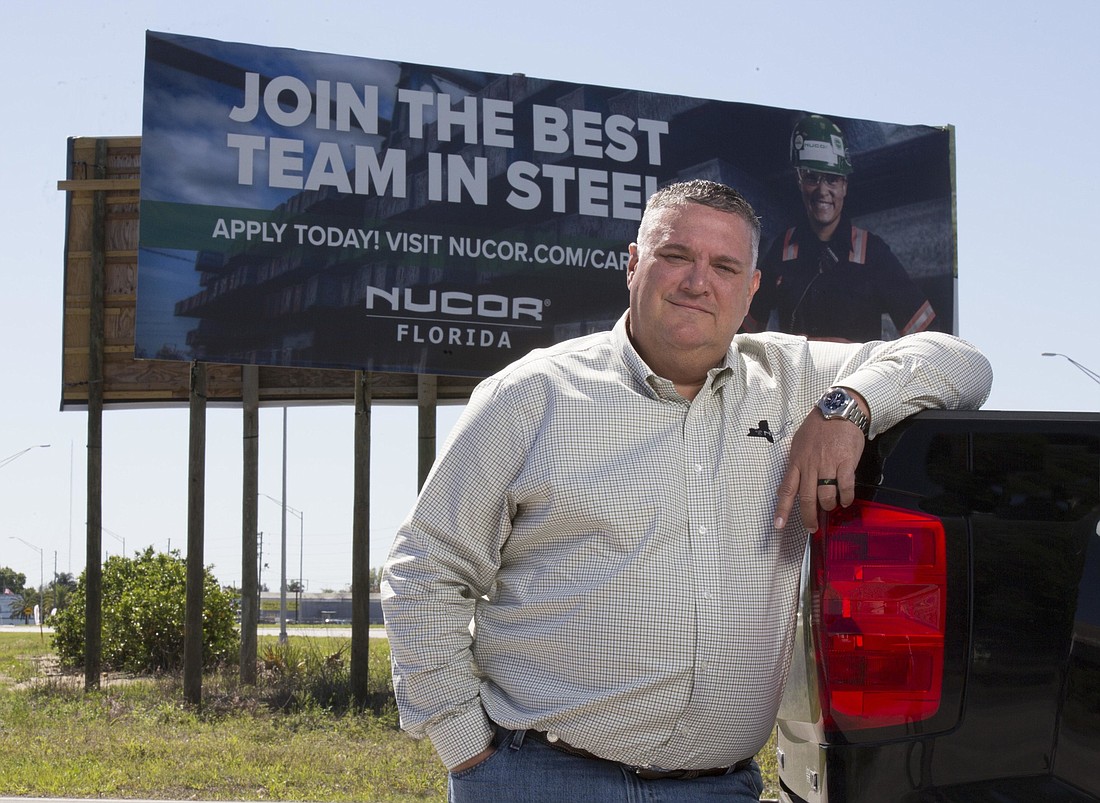- November 23, 2024
-
-
Loading

Loading

In March 2018, Nucor Corp., North America’s largest steelmaker, announced it would break ground in April 2019 on a $240 million micro mill on a 477-acre site off U.S. 27, south of Frostproof near the Polk-Highlands county line.
Officials with Nucor Steel Florida, the subsidiary created to build and operate the 256,000-square-foot plant, planned to create 250 jobs paying an average annual salary of $66,000, begin hiring in early 2020 and be producing by year’s end.
So far, the steelmakers’ commitment to meeting its schedule has been as solid as its product.
As planned, Nucor broke ground on its micro mill in April, will start hiring before March 2020 and “will begin production in the fall,” Nucor Steel Florida Vice President Drew Wilcox says.
“It’s happening as planned — we are in full construction mode,” says Wilcox, who will manage the plant. “We have about 250 contractors on site every day, working on foundations and pouring concrete. Everything is absolutely on schedule.”
‘Everything is absolutely on schedule.’ Drew Wilcox, Nucor Steel Florida
The construction force — mostly locals — will swell to about 450 at different stages of the project before the micro mill, which will produce 350,000 tons of steel rebar annually, is fired up by workers, also mostly locals.
Once hired, employees will enroll in a months-long program created by Nucor at Polk State Corporate College in Bartow to learn specialized new jobs. “All of that is still on schedule, and we will start hiring entry-level production teammates in the first quarter” of 2020, Wilcox says. “It’s still the plan.”
Charlotte, N.C.-based Nucor Corp. recycled 21.1 million tons of scrap metal into nearly 30 million tons of rebar steel to generate $2.36 billion in net earnings in 2018, a year that saw the company’s stock increase 24%.
Since its 1897 establishment as an automaker to its current 250,000 employees at more than 200 North America sites, Nucor has never had a layoff. Even before President Donald Trump imposed a 25% tariff on imported steel in March 2018, U.S. demand for rebar products was increasing and is projected to reach $155 billion by 2021, according a Research & Markets analysis.
Nucor wanted to come to Florida because the Sunshine State’s construction industry is heating up. Despite strong demand, Florida has few steel producers, which means much of the rebar demand is shipped from out-of-state. Nucor’s Frostproof micro mill is one of two new plants the company approved in 2018. It’s also building micro mill in Sedalia, Mo.
After looking at 60 sites from Miami to South Carolina, Nucor settled on an orange orchard owned by the Ben Hill Griffin estate because of its proximity to U.S. 27 and the CSX rail line.
The Frostproof plant will use scrap metal from local recyclers, including from Cincinnati, Ohio-based David J. Joseph Co., now owned by Nucor, which employs 650 workers in operating 23 Florida scrap metal recycling plants.
At $240 million, the micro mill is the biggest single capital investment in Polk County since the 1975 opening of the New Wales phosphate plant in Mulberry, now operated by Mosaic Co. that created about 300 jobs. The most recent was Coca-Cola’s $113 million bottling plant in Auburndale, which brought about 100 new jobs in 2003.
“Demand for steel in Florida continues to grow,” Wilcox says. “It justifies the investment.”
Unlike blast furnace plants that use mined iron ore as the major feedstock, Nucor’s Frostproof operation will be an electric arc furnace steel mill that uses scrap metal as feedstock and dramatically reduces emissions, energy utilization and water consumption.
In his 27 years at Nucor, Wilcox says the electric arc furnace steel mill is one of the industry’s biggest innovations. The Frostproof micro mill will have a smaller production capacity and make a narrower range of products specifically geared to Florida’s “targeted market.”
But not everything has gone according to plan, he says. One reason why the avid outdoorsman was eager to come to Central Florida is its “world class” bass fishing and hunting opportunities.
So far, not good, Wilcox says, noting he sees turkeys “every day on site” and knows there are lunkers, oversized fish, in the area’s ponds, lakes, streams and canals. “Haven’t got out much,” he laments. “Been too busy.”